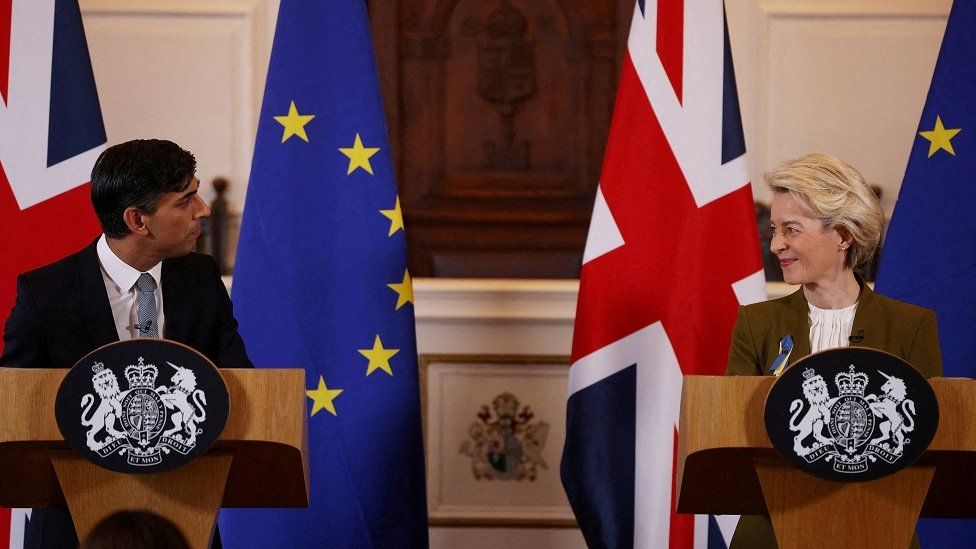ARTICLE AD BOX
 Image source, Reuters
Image source, Reuters
Prime Minister Rishi Sunak and European Commission President Ursula von der Leyen announced the deal in February
By Jessica Parker & John Campbell
BBC News correspondents
After more than a year of talks, which at times stopped, re-started or even imploded, big parts of the Windsor Framework will be signed off later.
The UK-EU deal is designed to make trade between Northern Ireland and the rest of the UK smoother.
It gives Stormont's Assembly more say over EU rules, and has been welcomed by most Northern Ireland parties.
However the Democratic Unionist Party (DUP) remains unconvinced and is still refusing to re-enter power-sharing.
Northern Ireland Secretary Chris Heaton-Harris said the party - Northern Ireland's second largest after Sinn Féin - has yet to come to terms with the significance of Wednesday's overwhelming parliamentary vote in support of the new Brexit deal.
No renegotiating
The joint UK-EU body that is overseeing Brexit will meet later to ratify the legal changes brought about by the Windsor Framework.
Speaking after meetings with the five main Stormont parties at Hillsborough on Thursday, Mr Heaton-Harris said the deal was done and would soon become international law.
"There is no renegotiating of that deal," he said.
Mr Heaton-Harris' comments came a day after MPs voted by 515 to 29 to support the deal agreed by Prime Minister Rishi Sunak.
It will open the door to talks in other areas of cooperation that had been blocked - including financial services and Britain's access to the EU's flagship Horizon research scheme.
But the DUP and some Conservative MPs voted against the deal, saying the UK government had to make changes to it.
For the DUP, it is not clear what its next move will be.
It is likely that the UK government will offer some constitutional reassurances to the party.
But Sir Jeffrey Donaldson may put that down as nothing more than tinkering around the edges rather than meaningful negotiation.
Where that would leave a possible return to power-sharing is the question - one without an obvious answer.
Mr Heaton-Harris said he would have to set Northern Ireland's budget for the coming year within the next few weeks if the executive was not up and running soon.
He added that Northern Ireland's public finances were "definitely not in a good state".
Sinn Féin vice-president Michelle O'Neill urged the DUP to stop its boycott of Stormont so that executive ministers could take control of the budget.
Ministers had to be in post to make the case to the Treasury for extra funding for Northern Ireland. ahead of a budget that Ms O'Neill said was set to cause "catastrophic damage to public services".
Alliance Party MP Stephen Farry said Northern Ireland was "bleeding", with problems piling up and public services in real crisis, reinforcing the impetus on the DUP to join other parties in ensuring Northern Ireland had "proper governance".
Ulster Unionist assembly member Robbie Butler said the level of budget cuts put Northern Ireland on a cliff edge and urged the DUP to put the public ahead of its issues with the Windsor Framework.
Social Democratic and Labour Party (SDLP) leader Colum Eastwood said the DUP had to accept that it could not get everything it wanted from the new Brexit deal.
More on new NI Brexit deal
Honeysuckle hassle?
A body representing horticultural businesses has said the framework leaves several issues unresolved for the trade in plants from Great Britain to Northern Ireland.
The Horticultural Trades Association (HTA) has written to the prime minister, complaining that the deal means "several key species of trees and plants will remain prohibited for exporting to Northern Ireland".
It said this includes popular species such as hawthorn, hazel, honeysuckle and jasmine.
However the government has suggested that those could permitted for Great Britain to Northern Ireland sales at a later date.
Image source, Rishika Sharma
Image caption,The Horticultural Trades Association has written to the prime minister to voice its concerns
The EU has strict rules on plant health and, under the original Northern Ireland Protocol, species it considered high risk were banned from being sent to Northern Ireland from Great Britain.
The framework means some but not all of those species are now permitted.
A government spokesperson said: "We have paved the way for 11 banned plant species to move again by the time of the next planting season.
"Those were priority cases identified by industry itself and we will progress further cases wherever there is industry appetite."
The HTA is also calling for the establishing of what it calls a British and Northern Irish Horticulture and Seed Potato Traders Forum to identify and work through the outstanding issues.
It is understood the government is planning to step up consultation with businesses in the coming weeks.
That is aimed at finalising the details of the trusted trader scheme and "green lane", which will be central to easing the flow of goods from Great Britain to Northern Ireland.

 1 year ago
27
1 year ago
27








 English (US) ·
English (US) ·